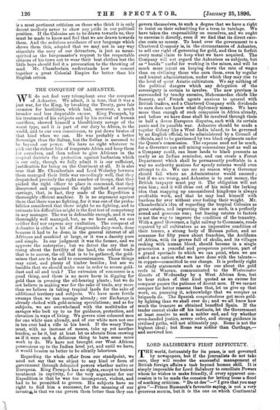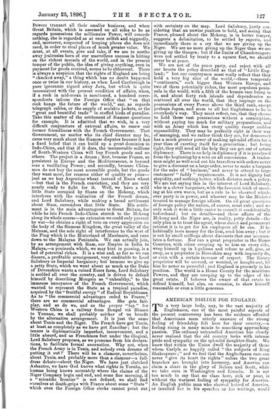LORD SALISBURY'S FIRST DIFFICULTY.
THE world, fortunately for its peace, is not Avverned by newspapers, but if the journalists do not take care, they will render the successful management of British foreign affairs a task beyond human skill. It is simply impossible for Lord Salisbury to conciliate Powers whom he wishes to make friendly, if every apparent con- cession is to be made the occasion for letting loose a. flood of scathing criticism., " Do ut des "—" I give that you may give "—Prince Bismarck's favourite saying, is not a very generous maxim, but it is the one on which Continental Bakers transact all their smaller business, and when Great Britain, which is assumed on all sides to be as regards possessions the millionaire Power, will concede nothing, she is regarded as at once selfish and niggardly, and, moreover, suspected of keeping places she does not need, in order to steal places of much greater value. We must, at all events, give and take, if we are to soothe away jealousies born of our marvellous success in hitting on the richest morsels of the world, and in the present temper of the public, the idea of giving anything, even in payment for goods received, seems to be abhorrent. There ie always a suspicion that the rights of England are being " chucked away," a thing which has no doubt happened once or twice in our history, as when Lord Castlereagh in pure ignorance signed away Java, but which is quite inconsistent with the present condition of affairs, when, if a rock in mid-ocean is mentioned, a hundred corre- spondents inform the Foreign Office that " on that rock hangs the future of the world," say, as regards telegraph cables, or the supply cf sealskin jackets, or the " great and beautiful trade " in stuffed birds of paradise. Take this matter of the settlement of Siamese questions for example. It is admitted that we wish, in a very difficult conjuncture of external affairs, to renew our former friendliness with the French Government. That Government, no matter who its chief director may be, cares very much about the Siamese disputes because it has a fixed belief that it can build up a great dominion in Indo-China, and that if it does, the innumerable millions of South-Western China will buy French goods and no others. The project is a dream ; first, because France, so persistent in Europe and the Mediterranean, is beyond seas a vacillating Power ; and secondly, because China- men do not buy the most accessible goods, but the goods they want most, for reasons either of quality or price— just as we buy Argentine wheat instead of Essex wheat —but that is the French conviction, and they are very nearly ready to fight for it. Well, we have a wild little State occupied by Shans on the Mekong, which interferes with the realisation of the French dream, and Lord Salisbury, while making a broad settlement about Siam, surrenders that little State. His settle- ment is in the main advantageous to Great Britain, for while he lets French Indo-China stretch to the Mekong along its whole course—an extension we could only prevent by war—he obtains a right of veto on every aggression on the body of the Siamese Kingdom, the great valley of the Meinam, and the sole right of interference to the west of the Ping which is the Hinterland of Maulmain, and runs down to the Malayan Peninsula. We can actually join, by an arrangement with Siam, our Empire in India to Malaya,—a peninsula which, we may hint in passing, is a bed of potential riches. It is a wise and, as far as we can discern, a profitable arrangement, very creditable to Lord Salisbury as Imperial bargainer; but because we give up a petty State, which we want about as much as the Duke of Devonshire wants a ruined Essex farm, Lord Salisbury is scolded all over the country, and is driven to defend himself by describing Mongsin as " unhealthy," to the immense annoyance of the French Government, which wanted to represent the State as a tropical paradise, acquired by the " fruitful energy " of Radical Republicans. As to " the commercial advantages ceded to France," there are no commercial advantages. She gets fair- play, and so do we, and as the proper " tap " for Western China is a railway from Bengal via Bbamo to Yunnan, we shall probably neither of us benefit by the alternative arrangement. It is just the same about Tanis and the Niger. The French have got Tunis, at least as completely as we have got Zanzibar ; but the tenure is diplomatically imperfect, inconvenient, and a little absurd, and as Frenchmen fret under the illogical, Lord Salisbury proposes, as we presume from his declara- tions, to facilitate formal annexation. Why not, when the French Army is in Tunis, and nobody even dreams of putting it out ? There will be a clamour, nevertheless, about Tunis, and probably more than a clamour—a full- dress debate—about the Niger. We have just clutched Ashantee, we have God knows what rights in Yoruba, no human being knows accurately where the claims of the Niger Company begin and end, and some fine morning, if a " scientific frontier " is not defined, we shall find ourselves at death-grips with France about some " State " which even the Foreign Office clerks cannot point out with certainty on the map. Lord Salisbury, justly con- sidering that an unwise position to hold, and seeing that France, pleased about the Mekong, is in better temper, suggests a delimitation, to be settled by experts, and immediately there is a cry that we are giving up the Niger. We are no more giving up the Niger than we are giving up the Ganges ; but if the limits of Chandernagore were not settled by treaty to a square foot, we should never be at peace. We are not of the peace party, and reject with all our hearts the policy described as that of "Little Eng- land; " but our countrymen must really reflect that they hold a very big slice of the world,—three temperate "continents," each bigger than Western Europe, and two of them potentially richer, the most populous penin- sula iu the world, with a fifth of the human race living in it, and about forty rich islands and dependencies so scattered all over the world, that they impinge on the possessions of every Power above the third rank, except perhaps Japan, and seem to all but Englishmen to be in everybody's way. They must reflect, too, that they choose to hold these vast possessions without a conscription, without paying too much for military preparations, and with an Army which has every quality except sudden expansibility. They may be perfectly right in their way of managing, and we rather think they are, for democracy has a much greater power of making splendid efforts for a year than of exerting itself for a generation ; but being right, they still need all the help they can get out of astute diplomacy. There is no help in diplomacy if it is paralysed from the beginning by a veto on all concessions. A trades- man might as well send out his travellers with orders never to give a discount on a large order, never to make a bargain for the sake of " business," and never to attend to largo customers' " faddy " requirements. It is not dignity but stupidity, and nothing better, which dictates such a policy. We are not saying this in the interest of Lord Salisbury, who is a clever bargainer, with the funniest trick of sneer- ing at his own wares, but as a rule to be observed which- ever party is in power, and whoever may be the Mioistcr trusted to manage foreign affairs. On all great questions of foreign policy the nation, of course, must rule ; and we only wish it were a little easier to consult it confidentially beforehand ; but on details—and these affairs of the Mekong and the Niger are, in reality, petty details—the only plan is to trust the agent, whose direct and permanent interest it is to get for his employers all he can. If he habitually loses money for the firm, send him away ; but it is not by small sniffings about discounts that one accumu- lates a fortune. Nor can a great proprietor in the Home Counties, with cities creeping up to him on every side, wrap himself up in legalisms and refuse to sell, give, or swap, as a proprietor in Ross-shire may with impunity do, or even with a certain increase of respect. The Surrey proprietor will be coerced, or worried, or bought-out, let him be never so powerful; and England is precisely in his position. The world is a Home County for the maritime Powers, and they are creeping up to the edges of tho great estate. It behoves the owner of that estate to defend himself, but also, on occasion, to show himself reasonable or even a little generous.



















































 Previous page
Previous page